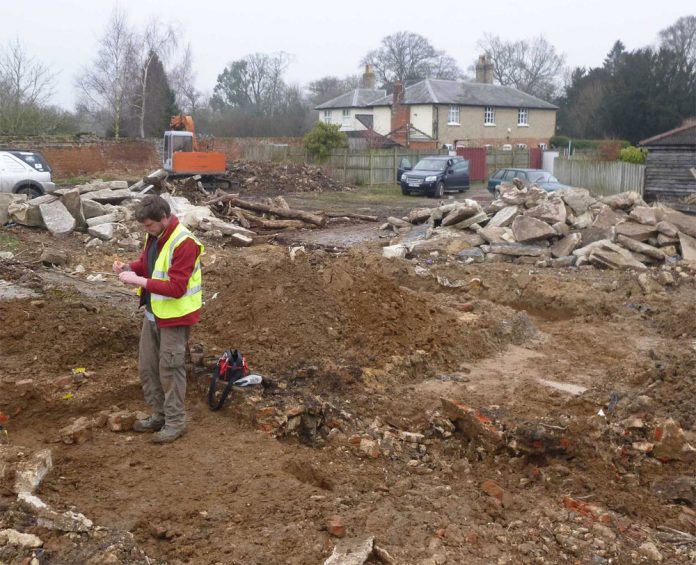CAT Report 824 written by Adam Wightman and Chris Lister examines the evaluated area within the historic farm complex of Pentlow Hall Farm, which included the site of a 16th-century timber-framed barn which burned down in the 1990s and may have been built on the remains of an even earlier barn. This was the Grade 2 listed ‘Lady Knights Barn’, which is thought to have originally been constructed about 1400.
In advance of residential redevelopment of the site, which was to consist of the removal of all commercial storage/hardstanding, the restoration of an outbuilding and the construction of a single house with associated landscaping. A mid 20th-century lean-to barn which had been built on the site was demolished before the evaluation.
Layers of history
Lady Knights Barn formed part of a farm complex associated with the medieval church and hall complex of Pentlow. The 12th- to 14th-century church and 15th- to 16th-century manor house both survive near the farm. Following the demolition of the modern barn, some of the brick plinths of the historic barn could be observed (see image above) . The visible plinths suggested that the barn measured 7.6 m by 31 m and was aligned north-west to south-east. The visible plinths were constructed of unfrogged red brick laid in English bond, and the earliest bricks were hand-made. The plinths had been heavily repaired. Interestingly, the core of one of the plinths included flint nodules, which may suggest an even earlier phase of foundation wall. This would have been a large barn in the 15th century, even if the two possible extension bays were later additions. These two later bays were added in the late 18th or early 19th century when grain production was high, during the ‘Golden Age’ of British farming.
Documentary record
The Listing entry reads: ‘… Barn. Circa 1400 under built C16. Timber framed and weather-boarded. Half-hipped corrugated asbestos roof. C20 lean-to to front and rear. 10 bays, two of which may be extensions. Jowled storey posts. Heavy arched braces to cambered tie beams with spandrel strutting. Late side purlin roof. Bridled scarfs to chamfered top plates. Good quality. Early map evidence for the barn suggests it had two midstreys. The Ordnance Survey 2nd edition of 1886 … shows two different-sized structures projecting from the south-west side of the barn, indicating the barn was used for threshing …’
The trial-trench revealed a layer of soil beneath the surviving modern concrete floor of Lady Knights Barn, but no earlier barn floor surfaces. The remains of a brick wall within the barn’s footprint indicate that it had included internal divisions. To the east of the site of the historic barn, the construction and demolition of the 20th-century lean-to barn had destroyed any archaeological features or layers on the site. However, the evidence of the sequence of three agricultural barns on the site, and its redevelopment as a residential unit, presents a fascinating angle on the history of farming and of Pentlow Hall and Hall Farm.
In 1400, Pentlow Hall belonged to the Cavendish family. In 1471, Pentlow Hall and the advowson of Pentlow church were inherited by Reginald Cobham, son of Sir Thomas Cobham, knight, of Starborough in Surrey, whose wife was Ann de Vere, widow of Aubrey de Vere, the executed son of the 12th Earl of Oxford. The Felton family owned Pentlow Hall from the late 15th century. George Kemp, Esq. owned Pentlow Hall in the late 16th century: he was the sixth son of William Kemp, Esq. of Spains Hall in Finchingfield, and he died in 1606.
Read the site report in the Trust’s online archive at http://cat.essex.ac.uk/reports/CAT-report-0824.pdf .

Source: Colchester Archaeology Trust

